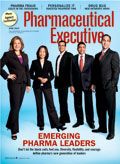Crackdown on Counterfeits
Pharmaceutical Executive
FDA and industry seek to ensure drug quality in a world complicated by global outsourcing and theft.
An international crime wave has hit the pharmaceutical industry. Counterfeiting rings are producing and selling prescription knock-offs that can make people sick. In March, some $75 million in prescription drugs were stolen from an Eli Lilly distribution center, and hijackers hit Sanofi-Aventis' Puerto Rico in January. Pfizer continues to wage war against widespread counterfeiting of Viagra (sildenafil), while GlaxoSmithKline seeks to halt e-Bay auctions of knock-off versions of its weight-loss drug Alli (orlistat).

Jill Wechsler
One report estimates that there is a $14 billion black market for counterfeit medicines in Europe, and that as much as 90 percent of drugs bought online are fake—often containing too little of the active ingredient. And the problem is even more serious in developing nations; the United Nations calculates that more than $500 billion in counterfeit drugs are traded each year throughout the world.
FDA officials and industry leaders are calling for concerted efforts to better secure the pharmaceutical pipeline, now extended by increased globalization in drug production and sourcing, and weakened by pressure to cut costs. The situation threatens to deteriorate manufacturer revenues and erode public confidence in drug quality and safety and in FDA's ability to protect consumers.
Rating Imports
In response, FDA is expanding oversight of imports and strengthening drug-tracking systems. The US now receives some 20 million shipments annually of food, devices, drugs, and cosmetics from foreign sources—up from only 6 million just a decade ago. Currently, some 40 percent of the drugs taken by Americans are imported, and about 80 percent of active pharmaceutical ingredients come from overseas. "Globalization has fundamentally altered our market landscape," stated FDA Commissioner Margaret Hamburg at the Center for Strategic and International Studies in February. She said that addressing global supply chain safety "is one of my highest priorities for FDA."
However, Hamburg and others acknowledge that FDA has the capacity to inspect only a tiny fraction of imports and less than 8 percent of foreign drug manufacturing plants each year. The agency has established offices in China, India, and other regions to increase its presence around the world, but these outposts are too small to handle on-the-ground oversight.
Thus, FDA has launched a major initiative to target its oversight of imports on the more risky food and drug products through the PREDICT (Predictive Risk-based Evaluation for Dynamic Import Compliance Targeting) information system. PREDICT ranks import shipments based on the nature of the product and past compliance experience of a producer or shipper, among other factors, and targets those products with high-risk scores for inspection. FDA is implementing PREDICT first for foods, while fine-tuning the system to make it viable for drugs.
The agency also has proposed a Secure Supply Chain Pilot project to provide "green lane" processing for drug imports from shippers and manufacturers with secure supply chains. Although announced a year and a half ago, the program has not yet been initiated because of difficulties working out the specifics with the US Customs and Border Protection (CBP) agency. The sticking point is how to offer priority processing most effectively for products from companies with validated security practices and controlled global supply chains.
In addition, FDA would like Congress to enhance its authority to detain and destroy illegally imported food and drug products. Food import safety legislation was approved by the House last November, but has been stuck in the Senate for several months, largely due to the legislators' focus on healthcare reform legislation. Once the food safety measure is enacted, Congressional leaders say they will take up drug import provisions that were pulled out of the broader FDA Globalization Act sponsored by Rep. John Dingell (D-MI).
At a PDA/FDA Pharmaceutical Supply Chain Workshop in April, Deborah Autor, director of the Office of Compliance in the Center for Drug Evaluation and Research (CDER), emphasized the need to update FDA authority over imports. Under current law, FDA has to show that a product is counterfeit or adulterated in order to block its entry. "That's backwards," Autor said, explaining that importers should have to demonstrate that a drug is safe in order to bring it into the country.
Ironically, efforts to reduce imports of counterfeit and adulterated medical products could be undermined by the continued push for drug reimportation. Sen. Byron Dorgan (D-ND) and Montana governor Brian Schweitzer have both requested federal permission to import drugs from Canada for these two northern states. However, FDA maintains that such a program would open the door to drug diversion and counterfeiting.
At a Senate budget hearing in March, commissioner Hamburg told Sen. Dorgan that there are "genuine safety concerns" about drugs imported outside the regulated supply chain. Drugs supposedly imported from Canada frequently come from other parts of the world, and many medicines ordered via pharmacy Web sites are counterfeit or substandard. Still, many politicians and consumers regard theses claims as mere ploys by pharma to lock out cheaper competition.
Industry Vigilance
FDA also is urging manufacturers to assume greater responsibility for ensuring the quality and safety of their products at all points on the supply chain. At the PDA workshop, CDER director Janet Woodcock called on industry to "up the ante on vigilance," and to devise real solutions to supply chain problems. Modern track-and-trace technology can help manage far-flung supply chains, but they should be linked to programs for qualifying suppliers and for monitoring global conditions. Also important are robust security measures able to deal with overt criminal activity, as well as networks for communicating within industry and with FDA on these issues.
Although increased outsourcing by manufacturers may appear to reduce production costs, Woodcock advised that such approaches may generate hidden expenditures. Suppliers with weak track records may require more extensive due diligence and monitoring, and doing business in countries with young regulatory systems may open the door to counterfeiting. It's the manufacturer's responsibility to ensure the reliability of suppliers, Woodcock emphasized, especially in times of ingredient shortages or political upheavals that can disrupt manufacturing and product distribution.
Alternatively, ongoing industry difficulties in managing supply chain issues may lead to stricter oversight and regulation by FDA. The agency is contemplating revisions in good manufacturing practices (GMPs) for starting materials, for example, and Congress may legislate stiffer tracking requirements and other safeguards.
FDA has taken an important first step toward a system that can identify legal vs. unauthorized products by establishing a standardized numerical identifier (SNI) for prescription drug packages. This policy meets a requirement of the FDA Amendments Act of 2007 (FDAAA) to develop standards and validated technologies that can better secure the nation's supply chain against counterfeit, substandard, adulterated, or expired drugs. FDA guidance issued in March specifies that the SNI should be based on a serialized National Drug Code (sNDC), combined with a unique serial number of 8 to 20 characters; FDA dropped a plan to include expiration date and lot/batch numbers to keep the SNI shorter and simpler.
The agency has also launched a campaign to heighten public awareness about the dangers of drug theft and diversion, and to spur manufacturers to improve warehouse and supply chain security. In an April letter to trade associations for manufacturers, wholesalers, pharmacists, and makers of medical devices and infant formulas, FDA advised companies to establish action plans for responding quickly to thefts, including prompt reporting of crimes and diversion to local and federal agencies.
Manufacturers believe that legislation aligning state, federal, and international supply chain management policies would support these efforts. US state licensing requirements for wholesalers and distributors vary considerably, and most states have no specific curbs on pharmacies that resell drugs from "questionable" sources such as hijackers. Legislation before Congress would strengthen FDA's authority over imports, support more plant inspections, and establish a uniform electronic pedigree system. Unfortunately, it may take another crisis, such as that with contaminated heparin, for Congress to move forward and for all manufacturers to invest more in programs to secure their supply chains.
Sharing information
In addition to identifiers and anti-theft action plans, FDA wants industry to communicate more quickly about emerging health risks and supply problems, with each other as well as with healthcare providers and regulators. A leading forum for this is the Rx-360 consortium, which is moving forward with initiatives to share information on supply problems and to develop standards and best practices for supplier audits. The group of some 40 manufacturers and suppliers recently launched a shared-audit pilot program that aims to reduce redundant supplier monitoring.
Such collaboration has been inhibited, however, by US antitrust laws that limit corporate information exchange on business practices and decisions. Both industry and FDA are interested in seeking advice from the Justice Department on how the group may discuss company audit results without violating anticompetition policy.
Jill Wechsler is Pharmaceutical Executive's Washington correspondent. She can be reached at jwechsler@advanstar.com

FDA Outlines Updated Requirement for Placebo-Controlled Trials in Vaccine Research
May 21st 2025In an article recently published by The New England Journal of Medicine, FDA higher-ups Vinay Prasad, MD, MPH; and Martin A. Makary, MD, MPH, wrote that any new COVID-19 vaccine must now be evaluated in placebo-controlled studies.
Navigating Distrust: Pharma in the Age of Social Media
February 18th 2025Ian Baer, Founder and CEO of Sooth, discusses how the growing distrust in social media will impact industry marketing strategies and the relationships between pharmaceutical companies and the patients they aim to serve. He also explains dark social, how to combat misinformation, closing the trust gap, and more.